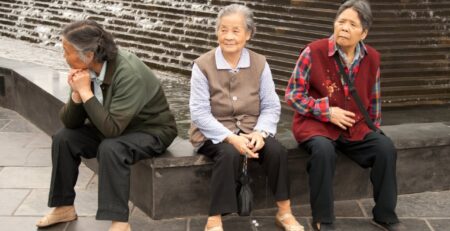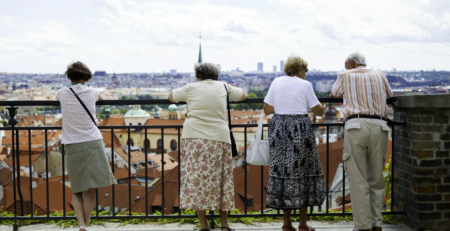Cambodia. NSSF began rolling but, is it a boon or bane for informal sector?
The much-awaited National Social Security Fund has begun rolling, covering 70 percent of about seven million workers or self-employed in the informal economy—about 85 percent of the total labour in the economy as a whole. But doubts still persist in the minds of informal workers and self-employed. They wonder why the NSSF is not providing both health care services and retirement pensions like those who in the formal sector as all pay a premium to NSSF.
In a major resolution issued on June 20 that will have far-reaching implications, the governing body of the National Social Security Fund (NSSF) has allowed millions of self-employed people across the country to register on a voluntary basis for their eligibility to avail the services provided by public and private health care service in the NSSF system.
NSSF’s resolution released a day after the issuance date stated that governing body has launched the implementation of NSSF schemes on trial for one year for health care services that self-employed people would be eligible to avail if they are less than 60 years of age at the date of registration in the scheme at NSSF offices.
The resolution signed by Ith Sameng, Minister of Labour and Vocational Training (MLVT) and Director Governing Body, sets mechanisms, requirements, forms and procedures of registration, premium payment, claim and service provision for the self-employed people who have correct names in Cambodia’s national identity card system.
NSSF Benefits
“The benefits include medical treatment and care and maternity… In case of failure of premium payment and dis-validity to consume medical treatment and care services, the registered members would be required to pay the remaining premium based on the number of months of failure to be eligible to re-use the services,” the document pointed out.
The resolution also pointed out that self-employed people who want to consume these health services are required to pay a premium on a monthly basis at 2.6 percent of their revenue fixed at approximately 600,000 riels or $150 million by the day 15 of the next month, or the annual premium payment can be requested and made to NSSF in a month after the registration date.
NSSF—Cambodia’s basic social security provider—pointed out all those registered in the scheme will automatically become NSSF members and be able to pay their respective premiums directly to NSSF offices or through the participating banks including the Acleda Bank Plc, Canadia Bank Plc and Advanced Bank of Asia Limited, or via NSSFPilotScheme.
“In case of the second failure of premium payment, members would not eligible to pay the reminding (remaining) premium to re-use the offered services, except the validity of health care scheme under the premium payment on a compulsory basis or in case of force majeure,” said the resolution, adding that the health care services are provided for free to the scheme’s self-employed members after they have fulfilled two requirements set out in the resolution.
Health care services
According to the six-page resolution, the NSSF members are eligible to avail medical treatment and care services for free at health care service facilities that are the partners of NSSF provided they have already been registered with NSSF and must have paid respective premiums for two months in a row during the trial period.
Medical treatment and care services of the NSSF scheme on voluntary payment of premium include treatment with admission at participating health service providers, outpatient, delivery, pre- and post-delivery or therapy or medical rehabilitation services, emergencies and patient, victim or dead body transportation services.
NSSF members would also be eligible to avail treatment and care services for chronic diseases that are included in the list of the resolution such as cardiac failure, cardiomyopathy, chronic hepatitis B, chronic hepatitis C, chronic renal disease, cirrhosis of the liver, coronary artery disease, dysrhythmias, multiple sclerosis, schizophrenia, systemic lupus erythematosus and thalassemia.
“Services for chronic diseases shall be provided only at public service facilities with the use of essential drugs. Using drugs out of the list of essential drugs shall be the expense burden of the patients except in emergencies. Drugs for diabetes and hypertension or high blood pressure do not exist in the list, while treatment of cancers with chemicals shall be paid based on fees,” the resolution pointed out.
However, the resolution also sets services that are not included in the category of medical treatment and care services such as free-of-charge treatment services set in the public health policy, dental care, transgender treatment and operations, self-treatment, artificial birth, body modification treatment and operations, birth inability treatment and heart operations, etc.
Preference to Women
NSSF members who are women are eligible to receive benefits for maternity if they pay premiums for nine months during the last twelve months as at the date delivery according to the resolution that states that the benefit for maternity is set at 1,260,000 riels or approximately $310 and during maternity leave, they are still required to pay premium to NSSF scheme.
“Claiming medical treatment and care services in case of emergencies and benefit for maternity shall be done in accordance with applicable regulations,” the resolution said, adding that the eligibility to claim medical treatment and care services in case of emergencies and benefit for maternity shall be valid for one year from the date of health problem occurrence or birth delivery or the date of this pilot project’s completion.
NSSF shall prepare separate accounting records for implementation on the pilot project for health care social security fund for self-employed in the informal economy and NSSF’s Director shall submit financial reports of the operations of the pilot project to the governing body on an annual basis, according to the resolutions that are comprised of 17 articles.
Equity Card
Speaking to Khmer Times yesterday, Heng Sam Orn, an independent analyst and a former senior official at an association of informal workers in Cambodia, said it is comforting that the governing body launched the formal implementation of the NSSF scheme on a voluntary basis for self-employed people as this institution has already provided its equity card to the self-employed since 2019.
Sam Orn further pointed out that NSSF has provided equity cards for free to self-employed people who registered through their respective membership they had to apply with any association registered with the Ministry of Interior to work with people who work in the informal economy or local authority such as commissions at traditional markets, for example, Orussey Market and Kandal Market.
“It is just a trial. It should not be like that because we have already tested it for a fairly long period of time. So, I want this time that charges people not be tested anymore. It should be general or formal implementation as I think the trial has already been done,” said Sam Orn, adding that the NSSF equity card that is valid for one year is similar to the IDPoor card.
NSSF resolution provides not only health care services but also retirement pension funds like other countries in the region such as Thailand and Malaysia, he said. “We generally welcome the resolution that reflects that the government pays attention to the informal economy, especially self-employed people at a reasonable premium.”
He said that the self-employed people will be eligible to receive the card that they applied with
NSSF after their respective free NSSF equity cards have currently been used become invalid. The resolution stated that self-employed people are required to re-apply for the charged NSSF card within 30 days after loss or damage and pay 5,000 riels to NSSF.
Vorn Pov, President of Independent Democracy of Informal Economy Association (IDEA), told Khmer Times that at least 70 percent out of about seven million workers or self-employed in the informal economy—about 85 percent of the total labour in the economy as a whole—have pushed for the implementation of NSSF for them to receive the benefits of pensions, according to the NGO official, who works closely with the self-employed.
Pov further said that employees in the formal economy pay 50 percent, while their employers pay another 50 percent, the self-employed do not have employers and thus the optimal deal should be 50 percent paid by them and another 50 percent should be contributed by the government.
“It is a very big number and so the government must work on this matter. We hope the government consider more to push for implementation of the law and include people from the informal economy to receive the benefits from the scheme” Pov before the issuance of the resolution, adding that the procedure of registration for NSSF has not been exercised broadly even though the pilot of the registration was undertaken for about 1,500 tuk-tuk drivers.
Pov went on to add that the social protection policy also covers the workers in the informal economy as it is inclusive. “After reopening the economy, the government has a cash transfer policy. So, the government should strive to find the possibility of registration of the informal economy’s workers as much as possible, which is in line with the government poverty reduction policy,” he added.
Pensions cover workers in the formal sector, but the government is yet to include those in the informal sector given the fact that the number of workers in the informal economy is far greater than in the formal sector.
The government issued a sub-decree that provides benefits to workers or employees who work in the formal sector including factories, but the Law on Social Security Schemes that was promulgated on December 2, 2019, stipulates that the social security scheme for pensions for the self-employed shall be determined by a sub-decree that is issued by the Prime Minister after being submitted by the ministers in charge.
The resolution has been issued after the self-employed people who contribute to the informal economy pushed for the implementation of the social protection policy to receive benefits from the NSSF, while the government has not issued a sub-decree that covers the group of people even though the Law on Social Security Schemes include them.
Holes in pockets
Taing Kimsea, a vendor of electronic accessories at O’russei Market in Prampi Makara district of Phnom Penh, told Khmer Times yesterday that 15,600 riels or nearly $4 per month that NSSF-registered self-employed people would be fine for those who have sufficient income to cover their respective business operations as there many sub-sizes among informal businesses.
“However, as we are in different levels of income and business sides, I think this amount of money may be big for those who can earn a little income just to cover their daily living, but for those who can make enough money, it may be fine. However, I think this initiative is good as it would at least cover medical expenses for most of us in the informal sector,” said Kimsea.
The vendor of electronic accessories such as memory cards, power banks and sound equipment at the local market pointed out that he has heard little about the social security schemes—both the NSSF equity card and the NSSF card. “That’s why when I or my family members go to any clinic, I have never used these cards to avail medical services there,” said Kimsea.
Eng Chamroeun, a tuk-tuk driver in Phnom Penh, told Khmer Times yesterday that he has heard about the new resolution from social media. It is a good initiative for people who earn income in
the informal sector as it would enable them to get those services for free even though they are required to pay some premium on a monthly basis.
However, Chamroeun wondered why the NSSF is not providing both health care services and retirement pensions like those who work in the formal sector such as garment factories as all members pay a premium to NSSF. While one group gets both, the other gets only one. “It is better if we can get both,” said Chamreoun.
“I have not considered about these offers yet, but I think it is good because at least we would save some money when we go to a clinic or hospital. When we have this kind of card, we would be treated for free, or else we would end up spending huge money on treatment services in those facilities. Huge amount is difficult for us to spend,” he said.
Chamreoun pointed out that about a $4 premium is acceptable, but if the amount is increased even though NSSF include both health care services and retirement pension funds, it would most probably be difficult for lower-income self-employed people. Also, most of them are not aware of when and where to register with NSSF,” Chamreoun said.
Read more @khmertimeskh











